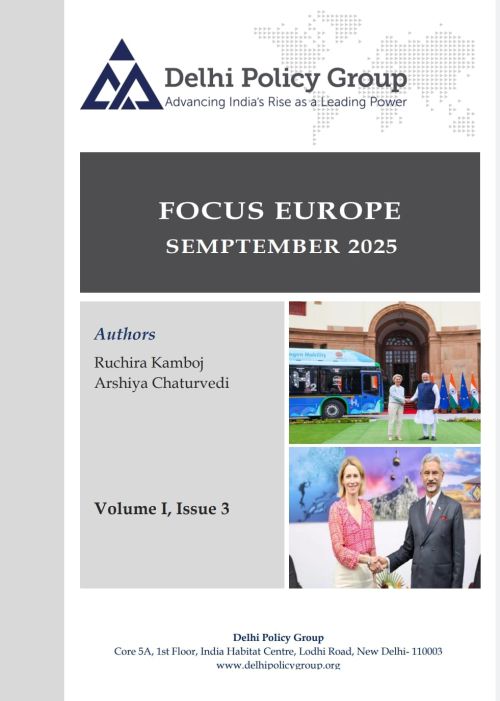Focus Europe
This monthly focuses on strategic developments in Europe and the evolution of EU-India relations, and in this issue the authors examine prospects and challenges of a “Renewed EU-India Strategic Agenda”.
Amidst growing global uncertainties, the EU-India relationship holds immense promise. The visit of the new College of Commissioners to India in February 2025 - the first to the Indo-Pacific - opened a new chapter, with both sides pledging to elevate their partnership “to boost shared prosperity, strengthen security, and tackle global challenges together”.
On September 17, 2025, this was taken further with the announcement of a ‘New Strategic EU-India Agenda’ by High Representative Kaja Kallas, recognising both sides as natural, mutually enabling partners with “the capacity and responsibility to shape global outcomes”.
The renewed framework rests on five pillars: prosperity and sustainability; technology and innovation; security and defence; connectivity and global issues; and cross-cutting enablers - signalling a clear ambition to deepen and diversify cooperation.
At its centre lies the EU-India FTA, expected to unlock major trade and investment flows. Although the September round of negotiations yielded limited progress, a fresh round due in October reflects continued resolve to conclude negotiations by end-2025 - with much depending on its outcome.
If there is a discordant note, it concerns India’s imports of Russian crude. Kaja Kallas has warned this could hinder closer ties, even as she has acknowledged there are no illusions about “decoupling India from Russia”. India, for its part, describes these imports as essential for its energy security and has criticised Western double standards, noting that others - including the US, EU, China, and Turkey - continue their own trade with Russia.
India’s UNGA-80 statement delivered by EAM Dr. S. Jaishankar offered the right perspective: that partnerships thrive not by imposing priorities but through mutual understanding and respect. A successful partnership accommodates differences, embraces diversity, and respects varying capacities.
This perspective must underpin a renewed EU-India strategic engagement, one built on fairness, reciprocity, complementarity and mutual interest. For this promising relationship to mature, the EU and India must acknowledge each other’s strategic interests and constraints, placing a premium on negotiation and collaboration rather than unilateral pressure. Such an approach would not only safeguard sovereignty and strategic independence, but also strengthen cooperation on areas of shared interest, turning points of difference into opportunities for deeper convergence.
To read this Focus Europe, Vol. I, Issue 3, please see the PDF attached.



